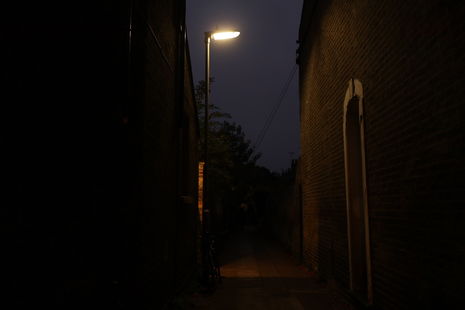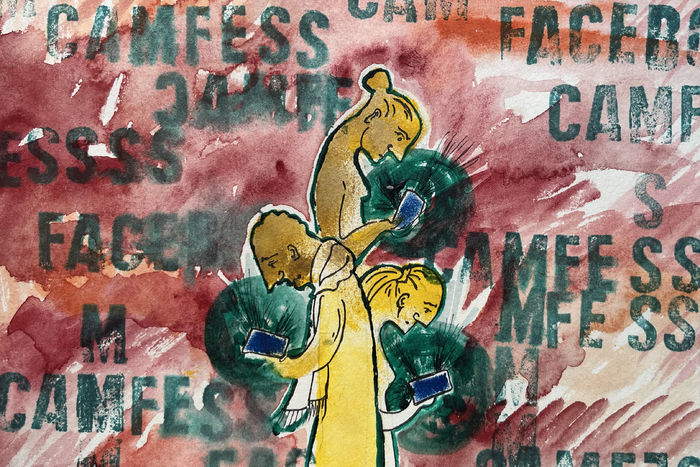It’s not my fault I was followed home
Talia Jacobs shares her experience of victim blaming and anonymous online discourse

On the night of July 9th, I was followed and harassed by a man I’d first seen beside a parked car, minutes from home, just outside Newnham College.
My pursuer was roughly in his 60s. He was wearing a blue cotton t-shirt, the kind with buttons up at the collar. He was sober, lucid, somehow perfectly normal: someone’s dad, or uncle, maybe somebody’s grandfather. When he told me he’d been there hours, waiting, I remember wondering if he’d a wife somewhere, someone who might wait up for him, question where he was, what he was doing. How stupid, telling my friends not to worry, I’d be home in two minutes, safe and sound from strange men who go bump in the night and won’t be deterred by gates slammed shut before them…
I would like to believe I did everything right, to acknowledge that I was alone for mere minutes, that I was sober, sensible, smart in my decisions. Yes, my path was secluded, fenced-in on either side - as were the other routes available; this was the shortest. The entire walk was some five-hundred-feet, roughly the length of King’s Parade. And I did what you do in these situations, once safe and secure; I locked the doors and windows, drew the curtains; I told my housemates, reported it to the police.
Most immediately, however, I called the college porters, who were kind and empathetic and tried to help me feel safe. What followed was a college-wide email containing such statements as ‘most inappropriate behaviours (or worse) are perpetrated when we allow the conditions for it.’ Beyond this came debates waged on the Facebook page Camfess, ranging from supportive outrage accusing college of victim-blaming, to anonymous defences which, however well-intentioned, only accused me of a reckless stupidity deserving public reprimand. When friends alerted me to what was erupting online, I wasn’t particularly surprised. I’d received the public email, along with a private one which I’m sure would add a veritable gallon of fuel to the fires of Camfess debates if I chose to share it. It’s routine; victims are demanded to reveal how they’d incited the violence done upon them. Or else mocked for the hypervigilance they’re expected to maintain.
“It’s a distinctly strange thing to be spoken about by people who don’t know they’re speaking about you”
No, I can’t say I was much surprised when presented with that onslaught of anonymous, patronising, rather brutal commentary. I certainly didn’t expect, however, the strangeness of my experience, anonymous though my name may have been, becoming the grounds for widespread debate; arguments waged online, conversations overheard in the Iris café. Once someone mentioned it to me without realising I was the very topic of their conversation. Online, I noticed staff members reacting to various comments.
It’s a distinctly strange thing to be spoken about by people who don’t know they’re speaking about you, people who don’t know that you are listening. If anything, the barrage of Camfess posts, all pointing to my own experience (dare I write my own victimhood?) made me peculiarly cognisant to the ease with which people discuss scenarios they know next-to-nothing about with the pompous grandeur of expert opinion. How little of what happened was made public, how massive people’s unabated opinions! One particularly enlightened commenter thought it astoundingly brilliant to equate my walk home with his ill-advised travels to dangerous regions overseas. ‘The situation is actually surprisingly analogous,’ he insisted, when someone came to the aid of myself and all the other surely reckless women who deign leave their bedrooms, missing the point that the road I live on is not a civil warzone.
Indeed, such situations are not abstract guessing games where generic advice fixes all, but particular and exacting situations which, fundamentally, you who read this knows nothing about. Harassment occurs in daylight, in busy, bustling places; all too often, no stranger dares intervene.
At Cambridge alone, I’ve been catcalled innumerable times, once badly harassed in broad daylight, surrounded by passersby who quickly looked away. I don’t share this for pity – these are everyday occurrences, so prevalent they barely warrant remark. A staggering 97% of women aged 18-24 have experienced public sexual harassment, according to a 2021 UN Women UK investigation, with only a miniscule 4% of victims coming forward.
And it’s no different at Cambridge. A report by Varsity and the CUSU found that nearly 8 in 10 female students had experienced sexual harassment here, yet over 85% never reported the incidents, frequently citing fears of not being believed, or of being blamed.
That impulse which has us scrutinise victim over predator is not incidental. Just last year, the University introduced a policy on student-staff relationships, which, while ostensibly intended to address power imbalances, officially warned students against behaviour ‘that could be interpreted as flirtatious’ – as if abuse stems from students too friendly, too naïve, not the adults deliberately pursuing baby-faced 18-year-olds. Cambridge has quite shockingly reinforced the logic that keeps so many silent. Their message is clear: whatever happened, it was probably your fault.
I don’t know why I feel the need to set the record straight. I can’t imagine any of the anonymous commenters know me. Really, I hate the idea of strangers tearing my decisions apart to fuel notions that one creates the conditions of someone else’s aggression. I refuse the abstraction of their arguments, much as they deny me my particularity. I cannot digest the torn-apart fragments they make of that night into a recognisable whole. Henceforth, I want to deal in nothing but particularity, the exact dimensions of my own experience.
“It’s routine; victims are demanded to reveal how they’d incited the violence done upon them”
But I know what I’m doing here – it’s undeniable. I attempt to absolve myself of blame, despite that little voice imperatively refuting such questions in situations with obvious perpetrators. I say I did everything right, but perhaps some right decisions are more right than others. Maybe I didn’t do everything right, maybe, in my own terms of particularity, I should’ve taken another route, insisted someone walk me home, or, as some might have it, not leave the house past sunset at all, some vampire in reverse.
So when I ask myself if I did anything wrong, it feels like I’m demanding proof of morality or immorality. The constant noise around it seems something of a punishment, as though I’d committed some terrible crime for which every action necessitates cross-examination. But I know where such punitive thinking leads us; when we ask if victims did everything right, we declare that those who didn’t, deserve what they got. When we shame miniscule imperfections, we deem innocent actions punishable, discourage reporting, strip ourselves of basic understanding.
Crucially, when we praise victimised women for ‘doing everything right,’ we imply that there’s someone out there more deserving of blame, shame, fear, violence. Laura Bates questions whether we’d grieve less those victims drunk, high, soliciting - those who defy the ‘perfect victim’ image. I wonder what statements Cambridge would make if indeed I had been drunk, stumbling, far-from-home, if the games of victim-blaming would remain had I been directly on college grounds and not fifty steps from them, if I’d been followed in broad daylight, if, god-forbid, I hadn’t gotten away. In this case at least, the public opinion of a worrying proportion of the staff and student population has made itself undeniably clear.
 News / Colleges charge different rents for the same Castle Street accommodation2 March 2026
News / Colleges charge different rents for the same Castle Street accommodation2 March 2026 News / News in Brief: waterworks, wine woes, and workplace wins 1 March 2026
News / News in Brief: waterworks, wine woes, and workplace wins 1 March 2026 News / Climate activists protest for ‘ethical careers policy’1 March 2026
News / Climate activists protest for ‘ethical careers policy’1 March 2026 News / Angela Merkel among Cambridge honorary degree nominees27 February 2026
News / Angela Merkel among Cambridge honorary degree nominees27 February 2026 News / Private school teacher who lied about Cambridge degree barred from teaching27 February 2026
News / Private school teacher who lied about Cambridge degree barred from teaching27 February 2026









